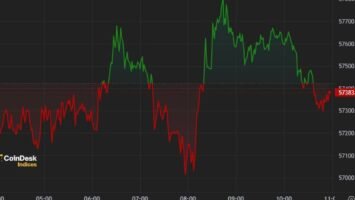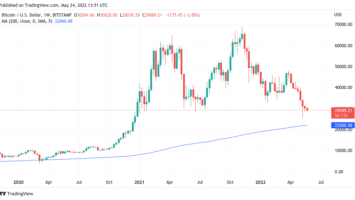
CARACAS, Venezuela — At first blush, it looked like cryptocurrency adoption was poised to make a huge stride in Venezuela.
Late last month, Venezuelan opposition leader Juan Guaidó announced he would use the digital currency exchange Airtm to redistribute some $19 million to Venezuelan health care workers. The money would come from funds that the U.S. government seized from the incumbent Maduro government. The “health heroes” funds would be delivered via Airtm’s stablecoin, AirUSD.
But after speaking to various medical personnel here, I came away with the impression that the health heroes campaign has been somewhat chaotic.
One health care worker told me what happened when she tried to register:
“Most people I know, who work like me in the health sector and have discussed the matter, couldn’t register and didn’t even know what Airtm is. … The first registration page kept failing and it made you go back to the beginning. … I only know one person who was able to register but has not received the confirmation email.”
Venezuela has become a popular example of the power of crypto, which is sometimes more reliable than our hyperinflated national currency, the bolivar. But the Airtm campaign is another example of how well-intentioned crypto campaigns are easily obstructed by the daily challenges of Venezuelan life.
Quarantine
Bitcoin adoption is low nationwide, but during quarantine its use appears to have grown a little. Bitcoin peer-to-peer trade volume has held steady in 2020. [Note: Paxful recently left Venezuela, citing U.S. sanctions.]
Venezuela currently has more than 60,000 cases of COVID-19 and the pandemic has only worsened Venezuela’s economic crisis. The vast majority of the population survives day to day and must decide between starvation or risking the virus to earn some money.
During quarantine, some people seemed to grow more interested in speculating in financial markets, including cryptocurrencies. That’s because Venezuela’s currency is so inflated that many consider it worthless. There are also many people with a desperate need to make money.
The bolivar remains volatile. The U.S. dollar is the more trusted currency, but some people think paper money can transmit COVID-19. There are a lot of digital payment options, but none are very popular. So accepting bitcoin and other cryptocurrencies has become more attractive.
Health heroes
COVID-19 has brought to light another big cryptocurrency story. Venezuela currently has a parallel government led by the opposition leader Juan Guaidó, who has also been declared president by the national assembly. In April, Guaidó promised to give bonuses to the health care workers who have been helping to manage the COVID-19 pandemic. The bonus would be around $100 a month for three months of work, which is not a small amount in Venezuela.
The health heroes funding, which adds up to at least $19 million, would come from money seized from the Maduro government by the United States and held by the U.S. Treasury Department.
It’s worth noting that the Venezuelan state has a cryptocurrency of its own, the Petro. The AirUSD bonus will probably be much easier to use than the Petro bonus that the Venezuelan government gave out at the end of 2019. Up until today, there are still people who have not managed to move those Petros.
According to Guaidó’s team, this campaign has four stages: application; verification and selection; registration in the digital platform (Airtm) intended for payment; and transfer of aid for three consecutive months. The last stage has already begun.
The first stage was chaotic because the Maduro government quickly blocked the registration page. There were also phishing attempts intended to steal personal data. One public employee said he received threats from his supervisor for trying to receive the funds. Two of five health care workers I spoke to did not manage to pass the first stage because they could not open the page because of the government’s block.
According to Guaidó’s team, more than 75,000 users were registered, and some 62,000 people were selected to receive the bonuses. It’s hard to know what percentage this is of total public health employees. Estimates range widely, and the only entity that would know the correct number is the Maduro government.
Airtm
Airtm, registered in Mexico, took off in 2017 after a pre-ICO for selected investors. The exchange manages a P2P market for its clients with its own stablecoin, AirUSD. The Airtm platform is supposed to transfer the funds to the workers. The personnel who have been selected have to register and verify their identity to access the voucher.
A spokesperson for the campaign said one reason this platform was chosen was because it met the requirements of being able to avoid national bank accounts, to pay out in dollars and to create accounts from an email address. Importantly, Airtm is also based outside of Venezuela and is thus safer from government retaliation.
Airtm’s P2P market has its own exchange rate. If users wish to transfer AirUSD to bolivars, they can do it within the Airtm platform but they still might have to deal with a Venezuelan bank account. Recently, Airtm blocked the use of Banco de Venezuela, the largest public bank in the country, to reduce users’ risk from some government actions.
Venezuela’s banking regulator has ordered the monitoring of banking transactions related to Airtm, in addition to blocking access to the web by telecommunications companies. In 2018 the platform was blocked by Internet servers because the government did not like that it gave an exchange rate for the dollar. Then, they stopped blocking it until Aug. 20, when they censored it again.
Now, authorities are even blocking the pages of virtual privacy networks (VPN) that could be used to access Airtm. The Guaidó and Airtm team are publishing educational content on how to use VPNs and how to change the DNS of their computers and avoid the censorship of VPNs by using mobile applications to access the web. They are even creating advisory groups called digital godfathers to help workers access the platform.
Jéronimo Bernot, who heads growth and client support at Airtm, told me that Airtm will consider any project that is aligned to their mission of financial freedom and inclusion. Would Airtm ever follow Paxful in ceasing to work with Venezuela? “AirTm is staying,” Bernot replied.
According to recent statements by Guaidó, 70% of the selected health personnel are carrying out the identity verification process at Airtm. Also according to Guaidó, more than 39.000 health professionals have received their first bonus of $100.
Feedback
To get a better understanding of the campaign, I spoke to some workers from the public health sector. They all said they were unaware of Airtm until the media promotion of the “Health Heroes” campaign.
Airtm’s Bernot told me that in anticipation of the campaign, the exchange grew their team by 20%. But there have still been bottlenecks in identity verification, for example.
“The biggest problem is that most of the doctors who receive this bonus are not very close to the world of technology, and many doctors are older. If you add to this the fact that peer-to-peer exchanges are not the most common option, things get even more complicated,” Bernot said.
But a rural doctor from the city of San Antonio de Los Altos acknowledged the campaign’s merits. Doctors continue to perform their medical duties, in spite of receiving a $3 salary every two weeks. As of Sept. 13, more than 126 health care workers reportedly died while working to fight COVID-19.
“It’s not the solution, but it does address certain needs,” the doctor said of the campaign. “The lack of biosafety material puts us at greater risk … [O]ur work with patients does not allow us to deny them medical assistance, but the reality is that our safety also matters. “
Another rural doctor from the same city said the campaign was a step in the right direction, given the risks health care workers face.
“Transportation has been affected and its availability reduced, leading to extreme and costly measures for health personnel who depend on these services. We have to acquire biosafety materials on our own[,] … exponentially increasing the exposure and risk of contagion of the entire medical team.”
To the doctor, the campaign is both fair and necessary:
“Not just thinking about the economics of those who will benefit from this bonus, but as a form of valuation that distinguishes the hard work performed by each person who makes up a link in our country’s health care system.”



Comments (No)